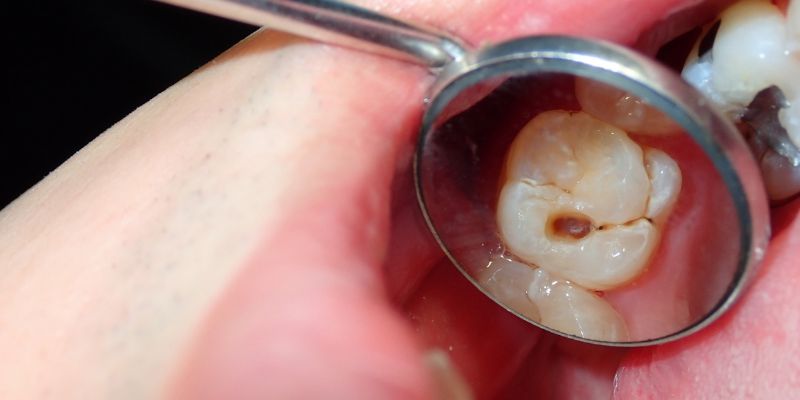Cavities 101: Causes, Prevention, and Treatment Options

We all have dealt with cavities at least once in our lifetime. They are a common problem affecting people of all ages. But the good news is that cavities are preventable and curable. Through this blog, let’s understand what causes cavities, how to protect them, and what treatment options are available.
What Causes Cavities?
Cavities are primarily caused by bacteria in your mouth that feed on sugars and starches from your food and drinks. Here is a detailed breakdown of the process:
Plaque Formation: When you eat, especially sugary or starchy foods, bacteria in your mouth feast on the leftover particles. This leads to the formation of a sticky film called plaque on your teeth.
Acid Attack: The bacteria in plaque produce acids as a byproduct of their feeding. These acids attack the enamel, the hard outer layer of your teeth.
Enamel Erosion: Over time, the repeated acid attacks weaken and erode the enamel, creating tiny openings or holes, aka cavities.
Dentin and Dental Pulp: If left untreated, the decay progresses through the dentin (the layer beneath the enamel) and can eventually reach the pulp, the innermost part of the tooth containing nerves and blood vessels. This infection of the pulp can lead to pain, inflammation, and even tooth loss.
Factors that increase your risk
Frequent snacking: Constantly munching on sugary or starchy foods provides more fuel for the bacteria in your mouth to produce harmful acids.
Poor oral hygiene: Not brushing and flossing regularly allows plaque to accumulate and harden into tartar, making it more difficult to remove and increasing the risk of decay.
Dry mouth: Saliva helps wash away food particles and neutralize acids. Certain medical conditions and medications can reduce saliva flow, increasing the risk of cavities.
Sugary drinks: Sugary sodas, juices, and sports drinks provide a feast for cavity-causing bacteria.
Preventive Tips
Brushing and Flossing: Brush your teeth twice a day with fluoride toothpaste and floss daily to remove plaque and food particles from between your teeth.
Healthy Diet: Limit sugary and starchy foods and drinks. Choose nutritious snacks like fruits, vegetables, and dairy products.
Fluoride: Fluoride strengthens tooth enamel and makes it more resistant to acid attacks. Use fluoride toothpaste and consider fluoride treatments from your dentist.
Dental Sealants: Sealants are thin protective coatings applied to the chewing surfaces of your molars to prevent food and bacteria from getting trapped in the grooves.
Treatment Options
When it comes to treating cavities and damaged teeth, there are a range of options available depending on the severity of the issue:
Fillings: For minor cavities, a filling is the most common solution, where the decayed portion is removed and replaced with a tooth-colored material like composite resin or porcelain.
Crowns: For larger cavities or weakened teeth, a crown, which is a cap that covers the entire tooth, may be necessary to restore its structure and appearance.
Root Canal: If the decay reaches the inner part of the tooth, called the pulp, a root canal procedure may be required to remove the infected tissue and save the tooth from extraction.
Extraction: In the most severe cases, where the tooth is beyond repair, extraction may be the only option to prevent further damage or infection from spreading to other teeth.
Conclusion
Cavities are a common problem, but they are preventable and treatable. By practicing good oral hygiene, making healthy dietary choices, visiting your dentist regularly, and looking for a dentist in Vivekanand Nagar, then, visit WellDent, which has the best team of doctors to treat cavities.




